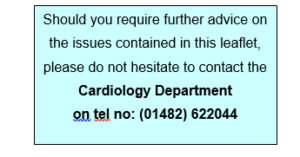- Reference Number: HEY-831/2023
- Departments: Cardiology
- Last Updated: 1 April 2023
Introduction
This leaflet has been produced to give you general information about your new medicine, Sacubitril Valsartan, also known as Entresto. Most of your questions should be answered by this leaflet. It is not intended to replace the discussion between you and your doctor, but may act as a starting point for discussion. If after reading it you have any concerns or require further explanation, please discuss this with a member of the healthcare team caring for you.
What is Sacubitril Valsartan (Entresto)?
You have probably had symptoms of a condition known as heart failure, which means that your heart is not working as well as it should. You are probably already taking medicines to treat this condition but are still experiencing symptoms such as breathlessness, tiredness and ankle swelling.
Sacubitril valsartan is a new medicine which has been shown to reduce the symptoms of heart failure. Your cardiologist (heart doctor) or heart failure specialist believes you may benefit from taking this medicine.
Are there any risks?
Like all medicines, some patients experience side effects when taking sacubitril valsartan. The most common side effect is a fall in blood pressure, which may make you feel light headed, dizzy or faint. This side effect is likely to become less noticeable with time, but if you feel you cannot cope, then please contact the heart failure clinic or tell your GP.
Other side effects may include changes in levels of chemicals in your blood (e.g. potassium) and how well your kidneys work. For this reason you must have a blood test 2 – 4 weeks after starting your new tablets. This will usually be done at your GP surgery or the GP will advise you where it will be undertaken.
Stop taking Sacubitril Valsartan and seek immediate medical attention if you notice any swelling of the face, lips, tongue and/or throat, which may cause difficulties in breathing or swallowing. These may be signs of angioedema (an uncommon side effect which may affect up to 1 in 100 people).
For more information about cautions, warnings and side effects, please read the patient information leaflet supplied with your medicine.
How do I take Sacubitril Valsartan (Entresto)?
Your first prescription for sacubitril valsartan will be written by your cardiologist or heart failure specialist and should be taken to the Pharmacy Department, Castle Hill Hospital who will supply 28 days’ of treatment (56 tablets).
You will usually start by taking a dose of 24 mg/26 mg or 49 mg/51 mg twice a day (one tablet in the morning and one tablet in the evening, roughly 12 hours apart). The dose may be adjusted depending on your response to the treatment until the best dose for you is found.
If you are taking medicines called ACE inhibitors (e.g. enalapril, lisinopril, ramipril, perindopril, quinapril, fosinopril, trandolapril) you must STOP TAKING THESE 48 hours before starting Sacubitril Valsartan. The formal required time is 36 hours (noted in your patient information leaflet), however to make it easier for you to plan the transition, you can leave 48 hours as suggested here.
If you are taking medicines called ARBs (e.g. valsartan, candesartan, losartan, irbesartan, olmesartan, eprosartan, telmisartan) you MUST STOP TAKING THESE WHEN YOU START TAKING SACUBITRIL VALSARTAN. You should take your last dose and then replace your next dose with sacubitril valsartan.
If you miss a dose, take it as soon as you remember. If it is nearly time for the next dose, do not take the one you missed. Take the next dose at the usual time. Do not double up the next dose.
If there are any other changes to your regular medicines, your cardiologist will tell you about these.
What happens afterwards?
The Cardiology Department will write to your GP to inform them of the changes made to your medicines.
You will need to make an appointment at your GP surgery for 2 weeks after starting your new tablets for a blood test. You will also need to make an appointment to see your GP 5-7 days after this blood test to discuss the results, check your blood pressure and review your medication.
If the sacubitril valsartan is helping, your GP will continue prescribing it. It is likely that your GP will increase the strength of the tablet, but you should still be taking ONE tablet TWICE DAILY.
This leaflet was produced by the Cardiology Department, Hull University Teaching Hospitals NHS Trust and will be reviewed in 2026 – HEY 831/2026
General Advice and Consent
Most of your questions should have been answered by this leaflet, but remember that this is only a starting point for discussion with the healthcare team.
Consent to treatment
Before any doctor, nurse or therapist examines or treats you, they must seek your consent or permission. In order to make a decision, you need to have information from health professionals about the treatment or investigation which is being offered to you. You should always ask them more questions if you do not understand or if you want more information.
The information you receive should be about your condition, the alternatives available to you, and whether it carries risks as well as the benefits. What is important is that your consent is genuine or valid. That means:
- you must be able to give your consent
- you must be given enough information to enable you to make a decision
- you must be acting under your own free will and not under the strong influence of another person
Information about you
We collect and use your information to provide you with care and treatment. As part of your care, information about you will be shared between members of a healthcare team, some of whom you may not meet. Your information may also be used to help train staff, to check the quality of our care, to manage and plan the health service, and to help with research. Wherever possible we use anonymous data.
We may pass on relevant information to other health organisations that provide you with care. All information is treated as strictly confidential and is not given to anyone who does not need it. If you have any concerns please ask your doctor, or the person caring for you.
Under the General Data Protection Regulation and the Data Protection Act 2018 we are responsible for maintaining the confidentiality of any information we hold about you. For further information visit the following page: Confidential Information about You.
If you or your carer needs information about your health and wellbeing and about your care and treatment in a different format, such as large print, braille or audio, due to disability, impairment or sensory loss, please advise a member of staff and this can be arranged.


